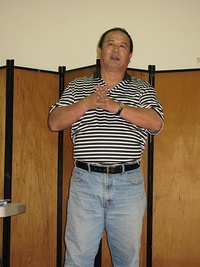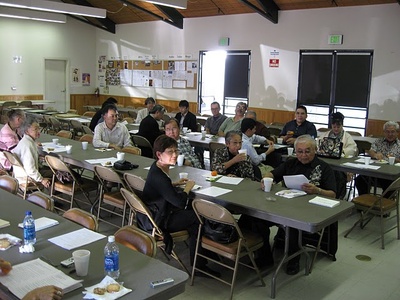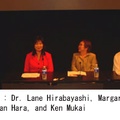I don’t remember ever having seen my birth certificate until I needed it for my application for graduate school. When it arrived, the most surprising bit of information on it was the two words “chick sexor” under “father’s present or last occupation.” What the heck was that? I wasn’t in contact with my father at the time, so it was quite a few years before I could be enlightened. (This was also before the time of instant Google searches on the internet.)
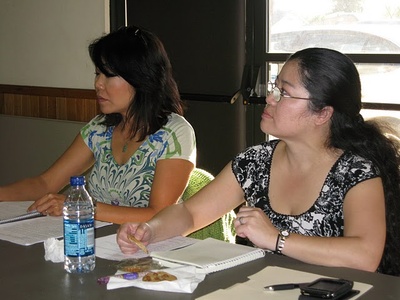
My parents had divorced when I was quite young, and my father was not in my life when I got married. When I was finally able to track Dad down, he had contracted Parkinson’s Disease, so trying to understand his slurred speech was difficult, not to mention the emotional challenges of reconnecting with an absentee father.
So a few months ago, I welcomed the opportunity to learn more about my father’s life and how he and 334 other men from Kagoshima came to America over fifty years ago. Incredibly, these men represented more than a third of the Japanese farm workers who were able to come to America on a total of 1,000 agricultural visas. All from Kagoshima, a small part of the country of Japan as a whole—amazing. And this was all thanks to Mr. Zenichiro Uchida, a fellow Kagoshima man.
Ted Uchida (right) was the Kagoshima Heritage Club’s guest speaker last November 14. His loving tribute to his father Zenichiro’s life entranced 25 guests with both memories and previously unknown facts about our family members’ lives. Without the elder Uchida-san, most of us whose family hail from Kagoshima would not be Americans today.
Zenichiro Uchida was born in Kushikino City in 1921, one of ten siblings. He graduated at age 17 from Kanoya Agricultural High School and was then admitted to Tokyo Kouto Norin University. He was forced to graduate from college a year early, however, because of the war.
In 1943, he entered the Ninth Air Force Educational Company and into Army Air Weather School as an officer graduate. Mr. Uchida fought in the most difficult front of the war, in the New Guinea Battle Zone. Of 13 men in his unit, 11 died. After surviving a prisoner-of-war camp, he believed that the rest of his life must be spent bringing peace to others.
Even though I never met the man before he died almost four years ago in March of 2006, it was as if Ted was channeling his father’s zest for life as he was speaking. When I looked up Mr. Uchida’s birth date, December 13, in an astrology book, it stated: “With your positive enthusiasm and vitality, you can be especially good at selling or promoting an idea or product.”
And that’s exactly what he did. The idea or product was the reputation of the Japanese citizen. Although Mr. Uchida had been successful in sending the first of 30 immigrants to America under the auspices of the Asian Refugee Relief Act in 1955, he had his sights set on bigger and better things. Ted stated that when one usually thinks of refugees, one doesn’t think of people who will necessarily enrich their new country.
Therefore, Mr. Uchida succeeded in 1957 in getting an agreement with the U.S. government for short-term agricultural workers. He knew that men like my father could make magic when working the soil of their new land. And this would bring them and Japanese citizens in general a level of respect that was lacking here after the war.
Mr. Uchida had heard stories of Japanese American soldiers who had fought bravely for America and yet were told, “Hey, Jap! Get out of here!” while being refused services like haircuts after the war. He wanted these incidents to stop, and showing Japanese men bringing a positive change to American land would go a long way in doing so, he thought.
A big setback occurred after all the immigrants were settled in their labor camps for their three-year work contract. Many of the men wanted to return to Japan after making their first one million yen. My father may have been one of them. Mr. Uchida did not think this would be seen favorably, since these visas were so hard-earned. So he started a letter writing campaign by the wives and children left behind in Japan. They wrote to their husbands and fathers to please stay put and that they wanted to join them in America soon. My own father took heed, married my mother in 1960, and brought her over in 1962, shortly before my brother Fred and I were born.
Mr. Uchida’s next idea was for Japanese to start businesses in America and have Caucasians working for them. Perhaps this was to show that Japanese could take on more responsibility and rise up from farm worker status. My father did his part by buying two liquor stores in the Southern California area. However, the men in Northern California turned yet again to the land and started large nursery operations growing roses, garlic, lettuce, and more. In fact, my grandparents on my dad’s side came to America for a while and started raising carnations up north, too. Mr. Uchida himself was able to start a nursery business with the sons of a Mrs. Shibata and other Kagoshima immigrants.
Even until the very end of his life, Mr. Uchida was telling the immigrants and their descendants to think about others. In his last speech, he urged, “If you feel you are fortunate to be here, in this rich land of opportunities, you must give back! Our Niseis and Sanseis should work hard to become leaders of this relationship between Japan and America. That is what I envisioned when I started the immigration movement.”
I felt for Ted because he was born in 1951, and shortly thereafter, his father began his activities to bring Japanese to the States. The senior Uchida was only 34 when he cried, “Let’s go to America!” to these men. He must have been incredibly busy with this endeavor because, according to his son, he thought of all the immigrants as his own children. When they “done good” in their new land, he was incredibly proud. And yet he was pretty tough on his biological children, who had to obey him and not have as much time with him because of his fervor to assist those not even related to him.
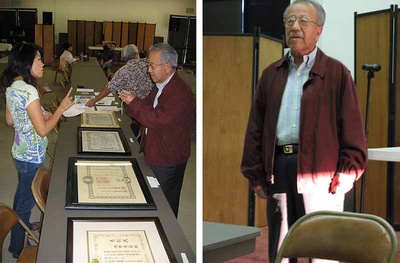
My favorite part of Ted’s talk was his touching story about his father’s last moments on earth. Mr. Uchida was dying of lung cancer in early 2006, and just three days before his death, he received news confirming his kunsho award (decoration of merit) from the Japanese emperor. He passed away peacefully at his home with his whole family by his side. At one point, he opened his eyes and looked at his faithful wife, opened his arms to her, and said one word: “Arigato.” In that one utterance, he must have been trying to make up to his family for spending most of his life helping others.
Last night, I asked my father whether or not he was happy that he had made it to the States when many others hadn’t gotten the chance. He said that although he truly missed his homeland and wanted to return at first, he ended up making the right choice by staying. This was big of him, since his life here hasn’t been a walk in the park, having been overshadowed by many trials and tribulations. It touches me that my father was able to remember so much about his life some fifty years ago, and talking to him for this article has allowed me to learn things about him I did not know.
And yes, I finally found out what a chick sexor was—a man who could quickly determine the sex of a chick and put it in one of two bins. This must have been very useful on a farm, and my father was one of the fastest and most accurate of them all. He also picked fruit such as apricots, pears, peaches, and plums for $1.10 an hour. But now, his children’s and grandchildren’s opportunities have grown to encompass so much more. And we all have Mr. Zenichiro Uchida to thank for that. Domo arigato gozaimasu, Uchida-san!
*This article was originally published on Kagoshima Heritage Club Newsletter Vol. 64 (Winter 2010).
© 2010 Kristine Satoko Haenschke


